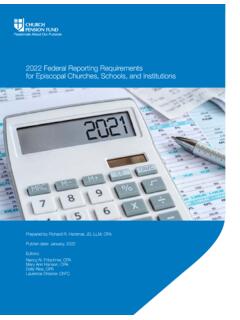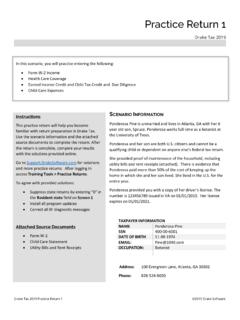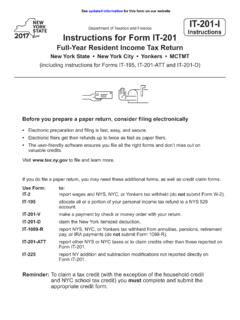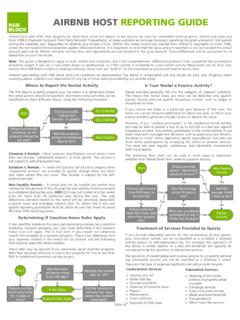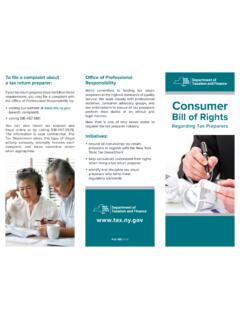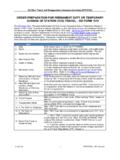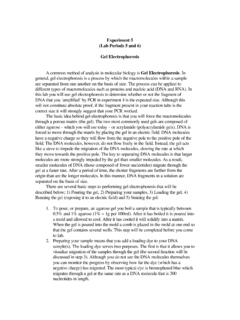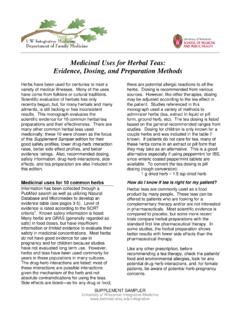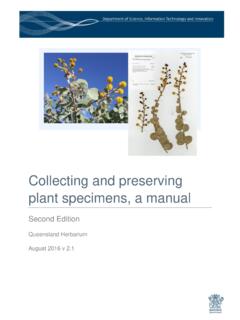Transcription of 2021 Clergy Tax Return Preparation Guide - CPG
1 2021 Clergy Tax Return Preparation GuideFor 2020 ReturnsA Supplement to the 2021 Clergy Tax Return Preparation Guide for 2020 ReturnsFor the 2020 tax year, the Church Pension Group (CPG) is providing the 2021 Clergy Tax Return Preparation Guide for 2020 Returns and the 2021 Federal Reporting Requirements for Episcopal Churches, Schools, and Institutions (Federal Reporting Requirements Guide ) as references to help Clergy , treasurers and bookkeepers, and tax preparers in better understanding Clergy taxes. These guides are available on CPG s website at supplement complements the guides. The supplement is presented in two sections.
2 First, a section on tax highlights addresses recent tax changes. Second, a question-and-answer format addresses key tax issues, and information provided in the guides and how it specifically applies to Clergy of The Episcopal : If you have questions about Clergy federal income taxes that are not covered here, please call CPG s Tax Hotline:Nancy Fritschner, CPA (877) 305-1414 Mary Ann Hanson, CPA (877) 305-1415 Dolly Rios,* CPA (833) 363-5751*Fluent in English and SpanishPlease note that the service these individuals will provide is of an informational nature. It should not be viewed as tax, legal, financial, or other advice.
3 You must contact your tax advisor for assistance in preparing your tax returnsor for other tax HighlightsThe SECURE (Setting Every Community Up for Retirement Enhancement)Act of 2019 is now law. Most provisions in the law became effective January 1, 2020. Listed below are some of the most important changes that could have a significant impact on you. The Required Minimum Distribution (RMD) age has increased from age 70 to 72. This change applies to anyone who will attain age 70 on or after January 1, 2020. This means that anyone who attained age 70 prior to December 31, 2019, will need to continue to take RMDs in 2020 and beyond.
4 Note: The CARES Act suspends the requirement to take an RMD in 2020. Contributions to traditional IRAs after age 70 are now allowed for anyone who is working and has earned income. Withdrawals of up to $10,000 from Code Section 529 plans (tax-advantaged higher education savings accounts) to repay student loans are now permitted. The SECURE Act makes this change retroactive to distributions made after December 31, 2018. New parents, through birth or adoption, are eligible to withdraw $5,000 penalty-free to offset the cost of qualified delivery or adoption expenses. Stretch provisions for beneficiaries of IRAs and defined contribution plans (such as the Code Section 403(b) arrangement known as The Episcopal Church Retirement Savings Plan (RSVP)) have been significantly modified.
5 The SECURE Act now requires designated beneficiaries of IRAs and defined contribution plans to withdraw all amounts within 10 years after the account owner s death. These provisions do not apply to the following eligible designated beneficiaries : the surviving spouse of the deceased account owner, a minor child of the deceased account owner (but only until the minorchild reaches the age of majority), a beneficiary who is no more than 10 years younger than the deceased account owner, or a disabled or chronically ill beneficiary (as defined by the Internal Revenue Code).A review of your financial and estate plans and IRA beneficiary elections, as well as a conversation with your financial professional, is strongly Coronavirus Aid, Relief, and Economic Security Act (CARES Act) was signed into law on March 27, 2020.
6 Here are some provisions of that act that may have affected you or your church or other institution during 2020. 1. Deferral of the payment of the employer s share of Social Security taxes: Social Security taxes due from March 27, 2020, through December 31, 2020, can be deferred until 2021 and 2022. Half of the deferred taxes will be due December 31, 2021, and the remaining half due December 31, 2022. 2. Use of retirement funds: The bill waives the 10% early withdrawal penalty for distributions up to $100,000 from IRAs and defined contribution qualified retirement plans (such as 403(b) plans, including the Church s RSVP plan) for coronavirus-related purposes, on or after January 1, 2020, and before December 31, 2020.
7 Withdrawals are still taxed, but taxes are spread over three years, or the taxpayer has the three-year period to recontribute to an eligible retirement plan without regard to that year s cap on 401(k) Loans: The loan limit is increased from $50,000 to $100, RMDs Suspended: Required Minimum Distributions from IRAs and 401(k) plans are Charity: There is a new provision that provides an above-the-line deduction up to $300 per individual for charitable contributions; plus, the limit on charitable contributions to qualifying organizations is increased to 100% of & AnswersEligibilityQ1. For tax purposes, who is considered a minister in The Episcopal Church?
8 A1. In The Episcopal Church, only bishops, priests, and deacons (ordained ministers, as opposed to lay ministers) meet the criteria for the IRS designation of minister. See the 2021 Clergy Tax Return Preparation Guide for 2020 Returns (page 11) and the Federal Reporting Requirements Guide (page 2) for an explanation of the importance of understanding whether you qualify as a minister for tax What types of organizations qualify as Church organizations?A2. Church organizations include Episcopal parishes and missions, dioceses, schools, and institutions associated with The Episcopal Church. The approval of an Extension of Ministry under The Church Pension Fund Clergy Pension Plan does not automatically qualify a cleric for Clergy tax treatment.
9 Also, pay received for work performed for organizations not associated with the Church may not qualify as the exercise of ministry. Work performed directly for the Church is considered exercise of ministry, no matter the nature of the work. Generally, work for non-Church organizations does not qualify for the housing allowance unless that work is primarily of Clergy TaxationQ3. What are the key federal tax provisions that apply to Clergy compensation?A3. The key provisions include the following:Self-employment tax. Clergy are not eligible to have FICA taxes withheld from their church compensation. In lieu of FICA taxes, Clergy pay self-employment tax, also known as Self-Employment Contributions Act tax (SECA).
10 Reimbursements from an employer of SECA are taxable as wages and are assessable under The Church Pension Fund Clergy Pension Plan. Note, however, that even though Clergy pay SECA tax, most ministers are considered employees and should receive a Federal Form W-2 from their taxes. Clergy must pay quarterly estimated taxes, or request that their employer voluntarily withhold income taxes. Clergy can request that an additional amount of income tax be withheld to cover their self- employment tax. The additional amount will be reported as federal income allowance. A cleric can have a portion of his or her salary declared as a housing allowance, and thereby exempt the eligible amount from federal income tax.




